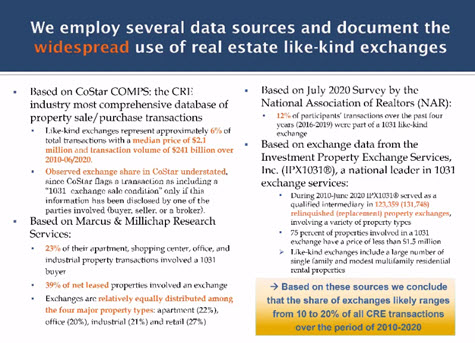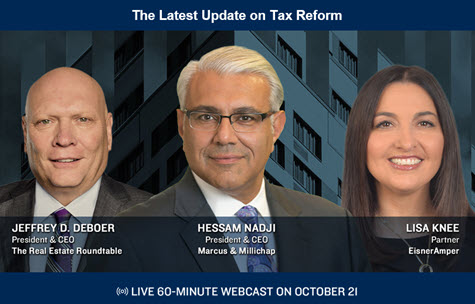A broad business coalition that includes The Real Estate Roundtable held a virtual briefing this week on the economic importance of like-kind exchanges (LKEs) for members of Congress and their staff. Additionally, several Roundtable members focused on the future of urban areas and economic growth during a “Stand With Cities” webcast.
- President Biden’s April proposal to restrict gain deferred through like-kind exchanges to no more than $500,000 per-year was included in the administration’s formal FY22 budget and revenue proposals released today. (Treasury Department’s Summary of Revenue Proposals, “Green Book” budget documents, and Roundtable Weekly, April 30)
- Yesterday’s congressional LKE briefing was moderated by Roundtable President and CEO Jeffrey DeBoer and featured the following speakers:
- Hessam Nadji, CEO, Marcus & Millichap
- Steve Chirico, Mayor, Naperville, IL
- Professor Milena Petrova, Syracuse University
- Dr. Robert Carroll, Ernst & Young
- The May 27 briefing focused on the longstanding, positive role of like-kind exchanges in the economy and the potential negative unintended consequences of limiting section 1031. (View video of the briefing)
- DeBoer said that as Washington policymakers consider whether and how to pay for infrastructure, clean energy, education, child care, housing and other policy goals, various tax provisions are under consideration, including the Section 1031 exchanges. He also noted how LKEs have been used to finance economic development and support local communities for 100 years – the provision is nearly as old as the income tax itself. (Exeter, history of Section 1031)
LKE Examples & Data

- Nadji described the practical uses of LKEs, which help small business, partnerships and family farms to reinvest profits—in this case, the capital gain earned in a real estate business or investment—on a tax-deferred basis so that a business can continue to grow. He noted that if the exchanges are restricted, it would stifle transactions and hamper the marketplace.
- Mayor Chirico gave real-world examples of how like-kind exchanges have provided an essential tool for attracting economic investment to his community. He stated that because of 1031, Naperville was able to secure a Costco store, which has produced jobs and as much sales tax revenue as their entire downtown business district. “The halo effect of all the Mom and Pop businesses that have now occupied vacant spaces in that very worn-out and distressed area that we once had – it has now been transformed, and it happened during the pandemic,” Chirico said.
- Professor Petrova addressed her extensive research into the macro-economic impact of LKEs with Dr. David Ling. In their recent study, “The Tax and Economic Impacts of Section 1031 Like-Kind Exchanges in Real Estate,” data shows how LKEs have helped preserve capital, allowed investors to upgrade their portfolios and make capital improvements.
- Petrova’s research also demonstrates how elimination of LKEs would likely lead to a decrease in CRE prices, less investment in real estate, greater use of leverage and a decrease in liquidity.
- Dr. Carroll discussed his recent study on the “ Economic contribution of the like-kind exchange rules to the US economy in 2021.” His key results focused on the positive economic activity supported by LKEs; employment supported by the exchanges, listed by industry; and taxes paid by and related to businesses that make use of Section 1031.
Stand With Cities

- Several Roundtable members participated this week in Commercial Observer’s “Stand With Cities” webcast, which focused on how civic, city, state, and business leaders are joining forces to strengthen the economies of U.S. urban centers. A list of all participants is on the event website. (Roundtable Weekly, May 21)
- Commercial Observer’s May 26 article about the webcast quoted The Roundtable’s DeBoer on the future of the state and local tax (SALT) federal deduction. “If there is a tax bill, there will be something on it that temporarily lifts the SALT cap or repeals it completely,” DeBoer stated.
- To view the entire webcast or individual panels:
- Full Video – Stand With Cities
- Today’s Urban Issues & Supporting Economic Growth
- A Closer Look at Urban Lifestyle Trends: Reimagining the Live/Work/Play Concept
- Talent Wars: How Cities Are Staying Competitive For the Top Workers in the U.S.
- Reviving Tourism, Entertainment, Retail & Hospitality
- Always Be Prepared: Resiliency Protecting Our Cities From the Next Disaster
- The Big Rethink: High-Level Takeaways & The Future of City Adaptation
Like-Kind exchanges and economic growth proposals under consideration by Washington policymakers will be a focus of discussion during The Roundtable’s June 15-16 Annual Business Meeting and Policy Advisory Committees Meetings (all remote).
# # #













